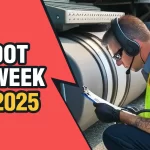Truck Drivers: Are They Missing the Basics of Trucking?
In recent years, there has been growing concern regarding the skills and knowledge of truck drivers on the road. While driving a truck may seem straightforward, it requires a comprehensive understanding of vehicle handling, road safety, and legal regulations. Unfortunately, it appears that some truck drivers may not be fully equipped with these essential basics.
One of the most fundamental aspects of truck driving is understanding the truck’s dimensions, including length, width, and height. A lack of awareness in this area can lead to accidents, especially in tight spaces or low-clearance areas. Additionally, driving a heavy vehicle demands a solid understanding of braking distances and handling in various weather conditions.
Another key area that seems to be overlooked is knowledge of the laws surrounding freight transportation, such as weight limits and required rest periods. These regulations ensure road safety and driver health, yet many drivers remain unaware of the details.
It is crucial that training programs address these gaps. A truck driver should be equipped with more than just the ability to drive; they must be well-versed in the basic principles that ensure their safety and the safety of others on the road.
Let's start from the beginning
Who Needs a CDL License in Florida?
If you’re planning to drive a large vehicle in Florida, you’ll likely need a CDL (Commercial Driver’s License). But who exactly needs one?
In Florida, a CDL is required for anyone who operates a commercial vehicle. This includes trucks that weigh over 26,000 pounds, buses that carry 16 or more passengers, and vehicles that transport hazardous materials. If you plan to drive these types of vehicles for work—whether it’s as a truck driver, bus driver, or hazmat specialist—you’ll need a CDL.
There are also different classes of CDLs depending on the vehicle size and type. Class A covers the largest vehicles (like tractor-trailers), Class B covers smaller commercial vehicles (like delivery trucks), and Class C is for transporting hazardous materials or passengers.
If you’re interested in driving a commercial vehicle in Florida, make sure to check the specific requirements and start your training to get your CDL. Given all this, we need to focus on one of the main issues here in Florida: the language barrier.
Federal Motor Carrier Safety Administration (FMCSA) regulations at 49 CFR 391.11.
English Language Proficiency: Drivers must be able to read, speak, and understand English sufficiently to converse with the general public, understand highway traffic signs, respond to official inquiries, and make entries on reports and records.
While it's true that many drivers on the road who don’t speak English are excellent behind the wheel, many struggle to speak or read the language, which can become an issue when driving.
Can Language Barriers Affect Your CDL Test?
If you’re taking your CDL classes in Spanish or another language but the final test is in English, this can definitely be an issue for some drivers. The language barrier might make it harder to understand certain questions or instructions during the test, especially if you're not fully fluent in English.
While many states, including Florida, offer the option to take the CDL written exam in different languages, the challenge comes when it’s time to actually take the road test and the final assessment. If your driving test instructions or road signs are in English, and you're not completely comfortable with the language, it can create confusion or mistakes that might affect your results.
However, it’s important to note that most CDL programs provide support for non-English speakers. Some programs offer extra training in the language you're most comfortable with, and there are often resources available to help you prepare for the test.
Ultimately, it’s a good idea to brush up on your English skills, especially when it comes to understanding road signs, traffic laws, and instructions, to ensure you’re fully prepared. This will help reduce any anxiety or confusion during the exam and make the process smoother.
Training Programs for CDL Drivers: A Solution to Prevent Accidents
When it comes to road safety, truck drivers play a critical role. However, without proper training, accidents can happen. That’s why investing in quality training programs for CDL (Commercial Driver’s License) drivers is crucial to preventing accidents on the road.
Training programs go beyond just teaching drivers how to operate a truck. They provide in-depth education on safety regulations, road laws, and vehicle handling techniques. By focusing on key aspects like defensive driving, weight limits, and proper maintenance, these programs ensure that drivers are fully prepared to handle any situation that might arise on the road.
One of the major benefits of comprehensive CDL training is reducing the number of preventable accidents caused by errors in judgment or lack of knowledge. Whether it’s navigating tricky road conditions, understanding traffic signals, or maintaining proper stopping distances, well-trained drivers are less likely to make mistakes that could lead to crashes.
Moreover, training programs also emphasize the importance of regular vehicle checks and staying up-to-date on the latest safety protocols. With ongoing education, drivers stay sharp and better equipped to deal with the ever-changing demands of the road.
By prioritizing CDL training, we can ensure safer roads for everyone and reduce the risks that come with improper driving practices.
The bottom line? Truck drivers need more than just a license—they need to be fully educated about the rules that keep everyone on the road safe. A little extra knowledge can go a long way in preventing accidents and ensuring smooth, safe travels for all.

